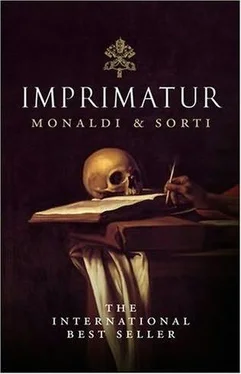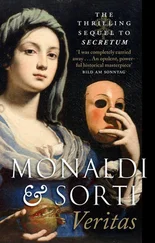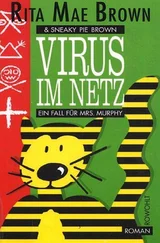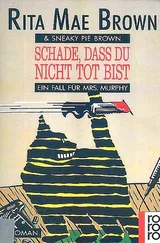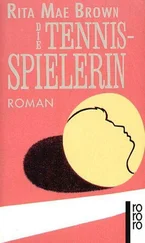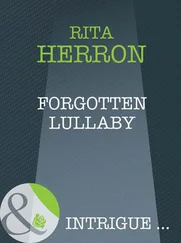Rita Monaldi - Imprimatur
Здесь есть возможность читать онлайн «Rita Monaldi - Imprimatur» весь текст электронной книги совершенно бесплатно (целиком полную версию без сокращений). В некоторых случаях можно слушать аудио, скачать через торрент в формате fb2 и присутствует краткое содержание. Жанр: Исторический детектив, на английском языке. Описание произведения, (предисловие) а так же отзывы посетителей доступны на портале библиотеки ЛибКат.
- Название:Imprimatur
- Автор:
- Жанр:
- Год:неизвестен
- ISBN:нет данных
- Рейтинг книги:5 / 5. Голосов: 1
-
Избранное:Добавить в избранное
- Отзывы:
-
Ваша оценка:
- 100
- 1
- 2
- 3
- 4
- 5
Imprimatur: краткое содержание, описание и аннотация
Предлагаем к чтению аннотацию, описание, краткое содержание или предисловие (зависит от того, что написал сам автор книги «Imprimatur»). Если вы не нашли необходимую информацию о книге — напишите в комментариях, мы постараемся отыскать её.
Imprimatur — читать онлайн бесплатно полную книгу (весь текст) целиком
Ниже представлен текст книги, разбитый по страницам. Система сохранения места последней прочитанной страницы, позволяет с удобством читать онлайн бесплатно книгу «Imprimatur», без необходимости каждый раз заново искать на чём Вы остановились. Поставьте закладку, и сможете в любой момент перейти на страницу, на которой закончили чтение.
Интервал:
Закладка:
Devize and Dulcibeni, by common accord, decide to bring their protege to Rome where, in the shadow of the Pope, the threatening emissaries of the Sun King are hampered in their movements. Of course, Dulcibeni has other designs… And, still in Rome, while playing his "Barricades Mysterieuses" for us, Devize knows that Maria Teresa has sent to Vienna the enigmatic quintessence of those notes, to bar the way to the plague which threatens to result in a Turkish triumph.
Now, of all this, Devize would never breathe a word. His devotion to Maria Teresa, if genuine, would surely not have been exhausted with the Sovereign's death. Moreover, the consequences of being identified as a plotter against the Sun King would certainly be lethal. Here again, I applied the rule which Atto Melani had taught me, thus relieving Devize of so perilous a task. I, a humble apprentice to whom no one accorded the least importance, would speak in his place, only a few, well-turned phrases. Not by his speech would I judge him, but by his silence.
A favourable opportunity was soon to arise. He had called me late in the afternoon, requesting a further light meal. I brought him a modest basket with a little salami and a few slices of bread, which he devoured voraciously. No sooner had he set to than I took my leave and made for the door.
"By the way," said I carelessly, "I hear, Sir, that Vienna is indebted to Queen Maria Teresa for having been spared by the plague."
Devize grew pale.
"Mmm," he mumbled in alarm, with his mouth full, rising to look for a sip of water.
"Oh, has it gone down the wrong way? Do have something to drink," said I, handing him a little jug which I had brought with me but had not placed near to him.
As he drank, he screwed up his eyes in puzzlement.
"Do you want to know who told me that? Well, you will be aware that, since his unfortunate accident, Signor Pompeo Dulcibeni has suffered greatly from fevers, and during one such crisis he spoke at great length when I happened to be present."
This was a great lie, but Devize swallowed it as eagerly as the water which he had just gulped down.
"And what… what else did he say?" he stammered, wiping his mouth and chin with his sleeve and endeavouring to remain calm.
"Oh, so many things which I have not perhaps even understood. The fever, you know… If I am not mistaken, he did mention a certain Fooky, or something of the sort and, I think, a certain Lozen," said I, deliberately distorting the names. "He spoke of a fortress, of the plague, of a secret of the pestilence or something like that, then, of an antidote, of Queen Maria Teresa, of the Turks, and even of a plot. In other words, he was delirious, you know how that happens. At the time, Doctor Cristofano was worried, but now poor Signor Dulcibeni is no longer in danger and has only to worry about his back and his legs, which…"
"Cristofano? Did he hear too?"
"Yes, but you know how it is when a physician is at work: he hears yet he does not hear. I also spoke of this to Abbot Melani, and he…"
"You did what?" roared Devize.
"I told him that Dulcibeni was sick and feverish and that he was raving."
"And did you tell him… everything?" he asked, overcome by terror.
"How am I to remember, Signor Devize?" I replied, politely piqued. "I only know that Signor Pompeo Dulcibeni was so far gone as no longer to be much with us, and Abbot Melani shared my concern on that account. And now, Sir, if you will excuse me," said I, slipping through the door and taking my leave.
Besides checking upon Devize's knowledge, I had allowed myself to take a little revenge on him. The panic which had seized the guitarist could not have been more eloquent; not only did he know what I and Atto knew but-as expected-he had been one of those most deeply involved. That was why I chuckled at the dreadful suspicion which I had sown in his mind: that Dulcibeni's delirious outburst (which had, of course, never happened) might, through me, have reached the ears, not only of Cristofano but of Abbot Melani. And, that if Atto so desired, he could denounce Devize as a traitor to the King of France.
My spirit was still oppressed by all the scornful treatment which the guitarist had always heaped upon me. Thanks to a few well-chosen lies, tonight I would at last enjoy the rich sleep of a gentleman, while his lot would be the troubled sleep of the outcast.
I must confess there was still one person with whom I would and should have liked to share that extreme intellectual solace, but those times had passed. I could no longer ignore the fact that, since his confrontation with Dulcibeni on the wall of the Colosseum, all was changed between Atto Melani and myself.
Certainly, he had unmasked Dulcibeni's criminal and blasphemous plot. Yet, at the moment of truth, I had seen him vacillate-and not on his legs, like his adversary. He had climbed the Colosseum as an accuser, he came down accused.
I had been stunned by his indecision in responding to Dulcibeni's allusions to the death of Fouquet. I had known him to hesitate before, but always only for fear of obscure, impending dangers. When he faced Dulcibeni, however, it was as though his stammerings arose, not from fear of the unknown, but from what he knew perfectly well and must keep hidden. Thus, Dulcibeni's accusations (the poison poured into the foot-bath, the order to kill received from the King of France), although unsupported by any evidence, sounded more final than any sentence.
Then, there was that strange, suspicious coincidence: as Dulcibeni had recalled, Fouquet's last words were "Ahi, dunque e pur vero"- "Alas, so it is really true"-a verse from an aria by Maestro Luigi Rossi which I had one day heard Atto sing in the most heartbroken tones. "Alas, so it is really true… that you have changed your mind." Thus the verse ended, like an unambiguous act of accusation.
Again, I had heard those same words murmured when, almost drowning in the Cloaca Maxima, we in our turn came close to leaving this world. Why, even then, in the face of death, had that verse come to his lips?
With the eyes of fantasy, I imagined that I had traitorously taken the life of a dear friend, and tried to immerse myself in the guilt that would surely consume me after such an act. If I had heard my friend's last words, would they not perhaps resound forever in my ears, until they found an open echo in my mouth?
And when Dulcibeni had accused him, reproaching him with that heartbreaking, lamenting verse, I had heard Melani's voice break under the weight of guilt, whatever the cause of that guilt might be.
No longer was he the Atto Melani I had known; neither the same fascinating mentor, nor the same trusted leader. He was again Atto Melani, the castrato, whom I had come to know when I overheard the talk of Devize, Cristofano and Stilone Priaso: Abbot of Beaubec by the prerogative of the King of France, intriguer, liar, traitor, spy of exceptional skill; and perhaps an assassin, too.
I remembered then that the abbot had never given me a satisfactory explanation as to why, in his sleep, he had murmured the words "barricades mysterieuses": and I at last understood that he must have heard them repeated, without understanding their meaning, when he was shaking the dying Fouquet by the shoulders and-as Cristofano had reported-crying out questions which were destined to remain forever unanswered.
In the end, I felt great pity for the abbot, deceived, as Dulcibeni had said, by his own King. By now I knew that Atto had omitted something from his account of his search through Colbert's study: he had shown to Louis XIV the letters which revealed Fouquet's presence in Rome.
I was utterly at a loss to comprehend: how, how could he have had the nerve thus to betray his former benefactor? Perhaps Atto had wished once more to demonstrate his unfailing devotion to his Most Christian Majesty. It would be an important gesture: offering the King on a silver platter the man whose friendship had, some twenty years previously, condemned him to exile far from France. Yet, this had been a fatal error, and the King had repaid the faithful castrato with yet another betrayal. He had dispatched him to Rome precisely to assassinate Fouquet, without revealing to him the true reasons for that terrible command, or the abyss of death and hatred within his own heart. Who knows what absurd tale the King concocted, or what shameful lies he employed to besmirch once more the trampled honour of the old Superintendent.
Читать дальшеИнтервал:
Закладка:
Похожие книги на «Imprimatur»
Представляем Вашему вниманию похожие книги на «Imprimatur» списком для выбора. Мы отобрали схожую по названию и смыслу литературу в надежде предоставить читателям больше вариантов отыскать новые, интересные, ещё непрочитанные произведения.
Обсуждение, отзывы о книге «Imprimatur» и просто собственные мнения читателей. Оставьте ваши комментарии, напишите, что Вы думаете о произведении, его смысле или главных героях. Укажите что конкретно понравилось, а что нет, и почему Вы так считаете.
